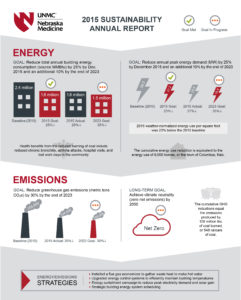Emissions
Emissions affect human health and the environment. Air pollution from burning fossil fuels has direct health impacts that contribute to asthma, respiratory irritation, chronic bronchitis, premature death, acid rain, and ground-level ozone (which leads to smog).1 Greenhouse gases also negatively affect the environment due to their contribution to climate change, which will impact Nebraska through more extreme weather events such as drought, storms, and heavy rain events.2 UNMC/NM’s largest amount of emissions is attributed to purchasing electricity, which is generated by Omaha Public Power District (OPPD) as a result of primarily burning coal, a fossil fuel that produces air pollution and greenhouse gases during combustion.3
BaselineAs defined by the Greenhouse Gas Protocol, |
GoalsShort Term: |

1 U.S. Environmental Protection Agency, Effects of Air Pollutants – Health Effects, available at http://www.epa.gov/eogapti1/course422/ap7a.html (accessed on December 2, 2012).
2 Presentation: Dr. Song Feng, Faculty, School of Natural Resources at University of Nebraska Lincoln, Climate Change and Nebraska: What does our future hold?, (October 20, 2012), Community meeting at First United Methodist Church, Omaha, Nebraska.
3 Omaha Public Power District, 2013 Annual Report, available at http://www.oppd.com/prodconsump10g/groups/web/documents/webcontent/22_008153.pdf (accessed February 15, 2014).



